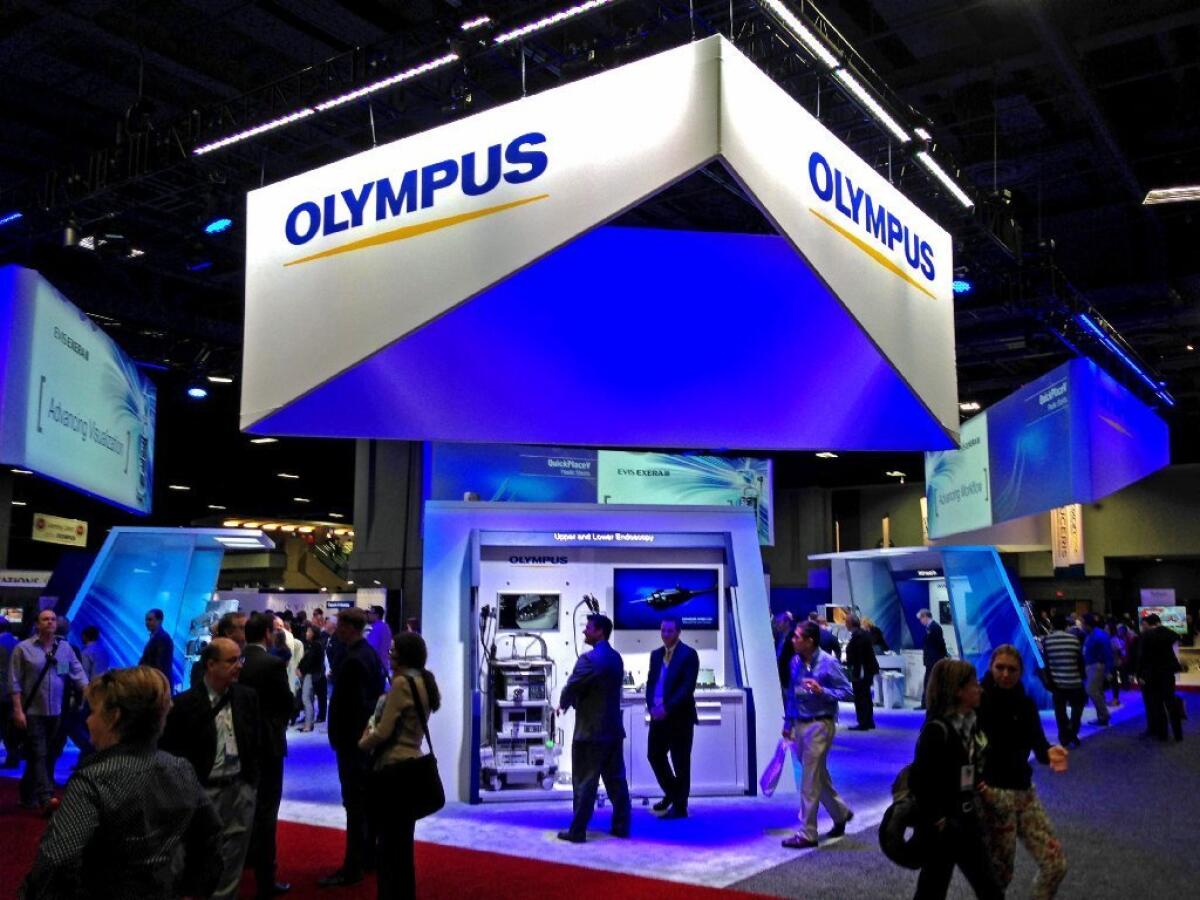Superbug outbreaks: Device maker Olympus reports 14% jump in scope sales

Olympus Corp. reported strong sales of its medical scopes despite recent superbug outbreaks and an ongoing federal investigation. Above, the company’s booth at a Washington conference in May.
- Share via
Embattled device maker Olympus Corp. posted a 14% increase in sales of medical scopes worldwide despite health officials linking its instruments to superbug outbreaks at U.S. hospitals.
The Japanese company, which also makes cameras and microscopes, said Thursday that the strong performance of its gastrointestinal endoscopes led to record-breaking sales and profit for its medical business in the latest quarter ending June 30.
The company’s increased sales have sparked criticism from some federal lawmakers and patient advocates who say it’s wrong for Olympus to benefit financially because design flaws in its duodenoscopes have contributed to the spread of deadly bacterial infections.
The U.S. Food and Drug Administration has warned medical providers that the duodenoscopes may not be free of lethal bacteria even if they follow the manufacturers’ cleaning instructions. Bacteria can become trapped in tiny crevices near the tip of the devices.
The spread of antibiotic-resistant superbugs from contaminated scopes has forced many U.S. hospitals to adopt new cleaning procedures for these reusable medical instruments.
But those extra measures, such as sending out these duodenoscopes for gas sterilization or quarantining them for 48 hours after cleaning for additional testing, have prompted some hospitals to buy more scopes from Olympus in order to have ample equipment. The devices can run $40,000 apiece.
Rep. Ted Lieu (D-Los Angeles) has asked Olympus to donate scopes to hospitals or forgo profits from the sale of additional devices.
A spokesman for Olympus said in March the company was reviewing Lieu’s request, and the company didn’t have any additional comment on its sales Thursday.
In a letter posted on its website, Olympus said it’s “dedicated to doing our part to work toward a solution that strengthens trust and confidence in duodenoscopes.”
Overall, Olympus said its fiscal first-quarter sales grew 12% to $1.51 billion companywide compared with the same period a year ago, and net income doubled to $130 million.
The company holds an 85% share of the U.S. market for specialty endoscopes, according to the FDA. Two other firms, Pentax Medical and Fujifilm, also make duodenoscopes.
During its release of quarterly results, Olympus offered details on another inquiry by the U.S. Justice Department.
The company said it recorded a loss of $19.4 million in connection with a federal investigation into its Latin American medical business and potential violations of the Foreign Corrupt Practices Act.
In May, Olympus confirmed that it received a subpoena from the Justice Department in connection with the scope-related outbreaks.
Separately, the company also has set aside nearly $450 million for an expected settlement of a U.S. investigation into its marketing of medical products. That inquiry centers on possible violations of laws that ban companies from paying kickbacks to doctors and other potential customers.
Olympus has faced criticism for selling a redesign of its TJF-Q180V duodenoscope without the necessary government clearance since 2010.
The company has said it didn’t believe further regulatory approval was necessary. At the FDA’s request, the company subsequently filed for approval, which is pending.
Federal health officials have tied Olympus devices to six of the nine superbug outbreaks that have been recently investigated in the U.S.
In Los Angeles, outbreaks from contaminated Olympus scopes have occurred at UCLA’s Ronald Reagan Medical Center and Cedars-Sinai hospital involving the superbug CRE.
At the UCLA center, eight patients were infected, including three who died.
Twitter: @chadterhune
More to Read
Inside the business of entertainment
The Wide Shot brings you news, analysis and insights on everything from streaming wars to production — and what it all means for the future.
You may occasionally receive promotional content from the Los Angeles Times.











